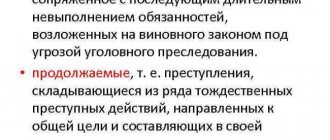Criminal Code of the Russian Federation in the latest edition:
Article 84 of the Criminal Code of the Russian Federation. Amnesty
1. An amnesty is declared by the State Duma of the Federal Assembly of the Russian Federation in relation to an individually unspecified circle of persons.
2. By the amnesty act, persons who have committed crimes can be released from criminal liability. Persons convicted of committing crimes may be released from punishment, or the punishment assigned to them may be reduced or replaced with a more lenient punishment, or such persons may be released from an additional type of punishment. Persons who have served their sentence may have their criminal record expunged by an amnesty act.
Return to the table of contents of the document: Criminal Code of the Russian Federation in the latest edition
Comments on Article 84 of the Criminal Code of the Russian Federation
Amnesty (amnestia) - translated from Greek means oblivion, forgiveness and is a legal form of state forgiveness of persons who have committed crimes.
The act of amnesty is the basis for terminating criminal prosecution.
“In its political and legal meaning, amnesty is an act of mercy, a manifestation of humanism, the generosity of the state towards citizens who have violated the criminal law, and implies the full or partial release of certain categories of persons from criminal liability and from punishment” (Determination of the Constitutional Court of the Russian Federation dated 18.09. 2014 N 1828-O).
The amnesty provides for several types of mitigation of the situation of convicted persons:
- exemption from the main punishment;
- reduction of the term (size) of the imposed sentence, including reduction of the unserved part of the sentence;
- replacing the imposed punishment with a more lenient punishment;
- exemption from additional punishment.
Persons who have served their sentence may have their criminal record expunged by an amnesty act. For example, clause 12 of the Resolution of the State Duma of the Federal Assembly of the Russian Federation dated April 24, 2015 N 6576-6 State Duma “On declaring an amnesty in connection with the 70th anniversary of the Victory in the Great Patriotic War of 1941-1945,” the criminal record was expunged from persons exempted from punishment on the basis of clause. paragraphs 1 - 4 and 7 - 9 of this Resolution.
An amnesty is declared in relation to an individually indefinite number of persons ; the act of amnesty is designed for repeated use. The decision to apply an amnesty is made by the relevant authority in relation to each person individually. These law enforcement acts (decrees, rulings), in addition to court decisions, are approved by the prosecutor. The resolution declaring an amnesty does not abolish or change the norms of criminal law, does not eliminate crime and the punishability of the act. Also, the amnesty act does not question the legality, validity and fairness of the court verdict.
Amnesty is an unconditional type of exemption from criminal liability and from punishment: the decision to apply an amnesty cannot be canceled regardless of the further behavior of the amnestied person.
Amnesty acts usually apply to criminal acts committed before its adoption or entry into force.
Exemption from criminal liability on the basis of an amnesty act in accordance with clause 3, part 1, art. 27 of the Code of Criminal Procedure of the Russian Federation is drawn up:
- at the stage of initiating a criminal case - by a decision to refuse to initiate it;
- at the stage of investigation or in relation to cases in which the investigation has been completed, but they have not been sent to court - by a decision to terminate the criminal case;
- in cases brought to court, if the act of amnesty came into force before the start of the trial, by a judge’s decision to terminate the criminal case (Article 239 of the Code of Criminal Procedure of the Russian Federation).
A person released from punishment as a result of an amnesty is considered to have no criminal record (Part 2 of Article 86 of the Criminal Code of the Russian Federation).
Amnesty does not mean the rehabilitation of a person and is only forgiveness for committing a crime. Therefore, release from criminal liability in connection with the amnesty act is possible only if there are no objections to this on the part of the accused. If there are such objections, the proceedings in the case continue in the usual manner and are brought to trial, in which the court decides either an acquittal or a conviction, but with release from punishment under the amnesty act.
Pardon
A pardon is an act of the head of state that partially or completely releases an individually identified person convicted of committing a crime from serving a sentence imposed by a court verdict, or removes a criminal record from an individually identified person who has served the sentence.
The implementation of pardons falls within the exclusive competence of the Russian Federation in the person of the President of the Russian Federation (clause “o” of Article 71, clause “c” of Article 89 of the Constitution of the Russian Federation, Part 1 of Article 85 of the Criminal Code of the Russian Federation), and he exercises this power in the form publication of a decree of the President of the Russian Federation. The procedure for considering applications for pardon in the Russian Federation was approved in 2001 (see: Decree of the President of the Russian Federation of December 28, 2001 No. 1500 “On commissions on pardons in the territories of the constituent entities of the Russian Federation” // SZ RF. 2001. No. 53.St 5149).
Pardon is carried out in relation to an individually identified (specific) person convicted of committing a crime (i.e. in respect of whom there is a court conviction that has entered into force and who is actually serving the sentence imposed by the sentence), and is usually associated with the availability of data testifying to the correction of the convicted person before the full serving of the assigned sentence or with some other exceptional circumstances under which it is advisable to pardon the convicted person.
According to Part 2 of Art. 85 of the Criminal Code of the Russian Federation, by an act of pardon you can:
- release a person convicted of committing a crime from further serving his sentence;
- reduce the amount (term) of the sentence imposed on a person convicted of committing a crime. Such a reduction is possible even below the lower limit established by the General Part of the Criminal Code of the Russian Federation for the type of punishment assigned to a person;
- replace the sentence imposed on a person convicted of committing a crime with any more lenient punishment. When replacing the death penalty imposed on a person by way of pardon, the discretion of the President of the Russian Federation is narrowed: the death penalty by way of pardon can only be replaced by life imprisonment or imprisonment for a term of twenty-five years (Part 3 of Article 59 of the Criminal Code of the Russian Federation);
- remove a criminal record from a person who has served his sentence.
As a type of release from punishment, pardon is mandatory (i.e., not dependent on the discretion of the body executing the decree of pardon) and unconditional (i.e., not subject to subsequent cancellation) type of release. The decree on pardon is executed in the manner established by the penal legislation.
Contents of the resolution declaring an amnesty
The resolution declaring an amnesty shall indicate the persons to whom the act of amnesty applies, the conditions for its application, as well as persons to whom the amnesty does not apply. In the preamble of the resolution declaring an amnesty, as a rule, the principle of humanism is indicated as a justification for its announcement.
The circle of persons who are subject to a specific amnesty is determined in the amnesty act itself by listing them in as much detail as possible (for example, minors; women who have committed a crime for the first time; military veterans; disabled people; persons convicted of crimes of a certain category or who have been assigned a certain type of and the amount of punishment, etc.). Typically, several such criteria are specified.
In the second part of the resolution on declaring an amnesty, by establishing certain restrictions, categories of persons who are not covered by the amnesty are determined. These restrictions are associated with the characteristics of the individual (malicious violators of the established procedure for serving a sentence) or with the nature of the crime committed (the so-called article-by-article restrictions).
For convicts in respect of whom, along with punishment, compulsory medical measures were imposed and subject to release from punishment, the amnesty act is usually applied after completing an intensive course of treatment.
In addition to the amnesty act itself, the State Duma usually adopts an additional resolution on the procedure for applying this act, which clarifies issues related to its application (the bodies entrusted with the implementation of the amnesty are determined, the content of the terms used in the amnesty act is revealed, etc. .).
Amnesty is an imperative (mandatory) type of exemption from criminal liability and punishment, since it does not depend on the discretion of the executing body and the will of the amnestied person.
At what stages of criminal proceedings can amnesty be applied?
The amnesty is under the exclusive jurisdiction of the Russian Federation (clause “o” of Article 71 of the Constitution) and is declared by the State Duma of the Federal Assembly of the Russian Federation (clause “g” of Part 1 of Article 103 of the Constitution) by adopting a resolution declaring an amnesty and a resolution on the procedure for applying the resolution about declaring an amnesty.
Amnesty is applied at different stages of criminal proceedings and, as mentioned above, provides for various types of mitigation of the situation of persons who have committed crimes: exemption from criminal liability, exemption from punishment, reduction of the unserved part of the sentence, expungement of a criminal record, etc.
In practice, there are cases where the act of amnesty itself provided for the possibility of terminating criminal cases in which the person who committed the crime is not known to law enforcement agencies. In such cases, clause 3, part 1, art. 27 Code of Criminal Procedure of the Russian Federation.
1) The amnesty act comes into force before the start of the trial
If the act of amnesty comes into force before the start of the trial on the merits, then the release of suspects (accused) from criminal liability is carried out by terminating the criminal case being processed by the inquiry body, the preliminary investigation body or the court, or by terminating the criminal prosecution. If the suspect (accused) objects to the termination of the criminal prosecution, the criminal proceedings continue in the usual manner (Part 2 of Article 27 of the Code of Criminal Procedure of the Russian Federation). As the Constitutional Court of the Russian Federation emphasized in its Resolution No. 18-P of October 28, 1996, the decision to terminate a criminal case does not replace a court verdict and, therefore, is not an act that establishes a person’s guilt. Therefore, a criminal case cannot be terminated if the accused objects to this and petitions to continue the proceedings.
2) The amnesty act comes into force during the trial
If the amnesty act comes into force during the trial, then the court, in accordance with paragraph 1 of Art. 254 of the Code of Criminal Procedure of the Russian Federation terminates the criminal case at a court hearing or, if the defendant objects to the termination of the criminal prosecution, continues the consideration of the criminal case in the usual manner until it is resolved on the merits. In the event of a guilty verdict and if there are grounds for applying an amnesty, the court releases the convicted person from punishment (Part 8 of Article 302 of the Code of Criminal Procedure of the Russian Federation). If there is a guilty verdict, we can only talk about release from punishment, and not about release from criminal liability.
3) The amnesty act was issued after the verdict was announced
If an amnesty act is issued after the verdict is announced, but before it enters into legal force, the court of second instance leaves the conviction unchanged and releases the convicted person from serving the sentence (Clause 1, Part 6, Article 302 of the Code of Criminal Procedure of the Russian Federation), if the verdict is not subject to cancellation or change for other reasons.
Who is eligible for amnesty?
As already mentioned, amnesty does not have an individual character. Amnesty is given to groups of people who are united on any basis. These may be persons involved in one criminal case, convicted under certain specific articles, or prisoners belonging to a special contingent, etc. For example:
- those who committed a crime through negligence;
- minors;
- pregnant women or having children under 3 years of age;
- veterans;
- elderly prisoners - men over 60 years old, women over 55 years old;
- military personnel and others.
The number of amnestied citizens can range from tens to hundreds of thousands of people. Under the amnesty, a criminal case that is under investigation or completed but not brought to court can be terminated. If proceedings on the merits have already begun, they continue until a verdict is rendered. The convict is then released under an amnesty.
Amnesty does not mean rehabilitation or cessation of a criminal case. Therefore, to close a criminal case on this basis, the consent of the accused is required.
This is due to the fact that the procedure is not a statement of innocence. Those released on this basis remain subject to criminal liability. The right of compensation does not apply to them; they should not be forcibly reinstated at work. The obligation to compensate the injured party also remains. If the suspect is against terminating the criminal case, closing it is prohibited. The court, finding the person who refused amnesty guilty, sentences him, but then releases the accused from punishment.
Amnesty deadline
The resolution declaring an amnesty specifies the period for the implementation of the amnesty (usually six months). However, this does not mean that after the expiration of the specified period, the amnesty act ends, since the amnesty is an indefinite act and all persons to whom it applies who committed crimes before the amnesty act came into force, regardless of the time the person was brought into criminal proceedings, are subject to its actions. responsibility.
the statute of limitations expires during the execution of the amnesty , not the provisions of the amnesty act, but the provisions of Art. 78 or Art. 83 of the Criminal Code of the Russian Federation as more preferential.
In judicial practice, there are situations when the actions of the perpetrator are subject to several acts of amnesty . If there are competing provisions, the provisions of the amnesty act shall be applied, the moment of entry into force of which is closest to the time of the commission of the crime, and the provisions of which are most favorable to the convicted person or other person to whom the amnesty act applies. In such cases, one should be guided by the criminal law principle of justice, and not by the provisions of Art. 10 of the Criminal Code of the Russian Federation.
Society's attitude towards amnesty
The original essence of forgiveness is the manifestation of the principle of humanism in criminal justice. However, in practice it allows you to solve other problems :
- saving budget funds - after all, imprisoned criminals need to be fed;
- reducing the workload of correctional officers;
- increasing the loyalty of former convicts and members of their families;
- favorable solution to political issues.
Society has mixed opinions about amnesty, but the majority are against it. Moreover, ordinary citizens and scientists give different arguments.
The first believe that criminals are obliged to serve their sentences, and the state's showing of mercy is unfair to the victims of crime. The latter argue that amnesty is an outdated institution, since legislation is constantly being improved and practically eliminates the unjustified prosecution of individuals.
Both ordinary citizens and scientists are partly right. Thus, amnesty does not apply to persons who have committed grave and especially grave crimes. The State Duma will not release serial killers, rapists, robbers and drug dealers from prison.
Amnesty is rather an opportunity to help rehabilitate people who have stumbled in life by accident. Recidivism among those amnestied does not exceed 5%.
One of the most sensational in the history of Russia is the Beriev amnesty of 1953 . Many believe that as a result of its implementation, millions of dangerous criminals dispersed from prisons across the country.
In fact, most of the monasteries of the Gulag (what is this?) were imprisoned due to the strict legislation of the USSR in the 30s. Then even the release of defective products threatened the management of the enterprise with a sentence of up to 8 years.
In addition, a limited circle of people were included in the Beriev amnesty: those sentenced to imprisonment for up to 5 years, pregnant women, mothers of children under 10 years of age, people with serious illnesses and the elderly. The recidivism rate (what is this?) among those amnestied did not exceed 7%.









